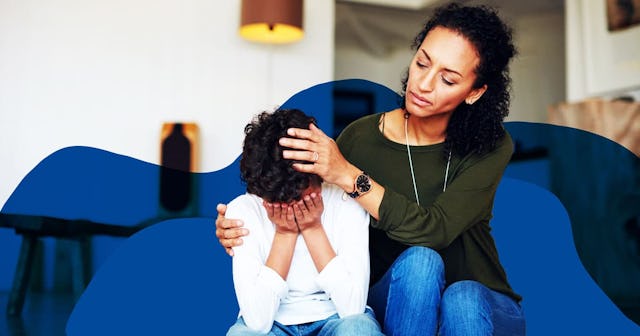I Never Knew How Much My Kids' Struggles Would Break My Heart

“Making the decision to have a child — it’s momentous. It is to decide forever to have your heart go walking around outside your body.” — Ellen Cantarow
This quote is like a punch in the gut on days like today, when I feel its overwhelming and absolute truth so keenly it almost makes me sick. This morning, I put my heart on the school bus, crying, sending it off with my son who suffers from anxiety and was having a rough start to the day. He had begged me not to make him go to school … again. I felt each tear that fell from his soulful brown eyes in my own soul, every drop like a knife slash.
I wanted nothing more than to brush off all obligations, both his and mine, and just snuggle him until he was soothed. But that isn’t a feasible option, and I can’t let him take a mental health day every time he struggles in the morning. Because I’m a mom, and it’s what we do, I masked my own anguish and gave him hugs and cheerful encouragement: he would see his friends, he would have gym class today (his favorite), he would be able to take a break from class and speak to the counselor if he needed to.
“Your day will get better, I promise,” I whispered, my voice convincingly steady and reassuring. I shuttled him out the door and onto the waiting bus as he wiped tears away with the back of his hand.
As the bus pulled away, I took off the mask and let my own floodgates open. I wasn’t crying because my son’s problems ruined my morning. I was crying because my son was having problems. Because this is one of the things nobody prepares you for when you become a parent: whatever happens to your child, you feel. Deeply.
No parenting manual can prepare you for this. Nobody told me that the first time I saw my child suffer, the magnitude of my own reaction would take my breath away. I realized that it would hurt to give birth. I didn’t realize that the emotional impact of motherhood would be far more painful in the long run.
LSOphoto/Getty
When your kid hurts, you hurt. It’s not a secondary pain, or some sort of dulled-down residual sympathy; it’s as sharp as though it were happening to you and you alone.
But not only do you feel the sting of each rejection, the disappointment of each loss, the agony of each struggle — you feel the accompanying guilt of your reaction to it. Did I do enough? Did I say the right thing? Have I raised my child to be resilient enough to get through this? And, of course, the burden of helplessness that comes along with knowing you can’t shoulder their pain. Their battles may be theirs to fight, but you’re still left bleeding on the battlefield.
Our torment goes unsung, our wounds left to heal without concern, because our kids don’t know how much we feel on their behalf. They have no idea that their classmate’s snide comment cuts us as deeply as it does them, or that the crushing disappointment of losing an important game or a special keepsake or a good friend puts the same squeezing ache into our hearts.
My son won’t realize that I spent my first twenty minutes of work this morning sobbing at my computer because I can’t magically make his troubles disappear. Or that my thoughts anxiously wandered to his side again and again as he went about his day, hoping they’d somehow nudge invisibly against his consciousness and he’d be comforted by their presence.
To feel so deeply for someone is beautiful in its own right, but it’s also a guarantee that for your entire life, you’ll never be able to worry only about yourself ever again. Your problems will never be the only problems that stress you out any more. You have taken on a lifetime commitment to bear the agony of your children’s heartaches, and to do it silently, because the last thing you want to do is make it feel worse for them.
I didn’t know their pain would hurt me so much. I never read that in any of the parenting books.
But then again, maybe it’s better that we don’t.
This article was originally published on